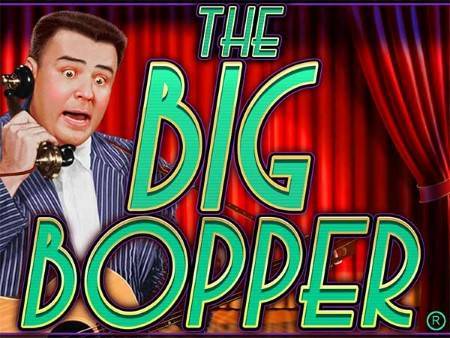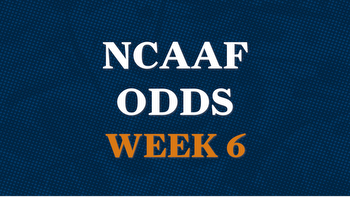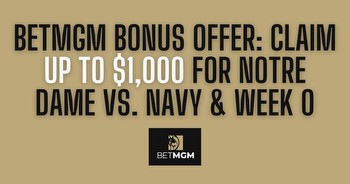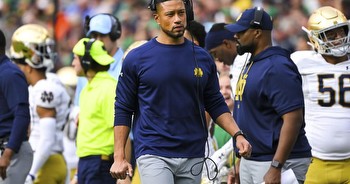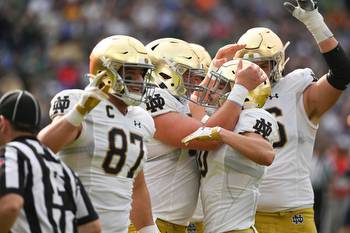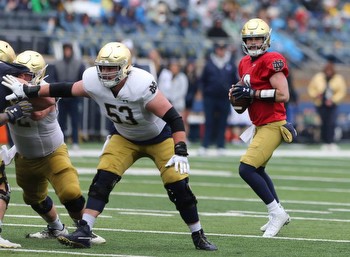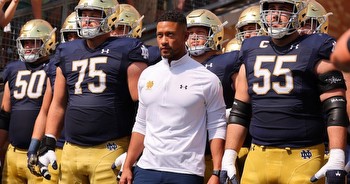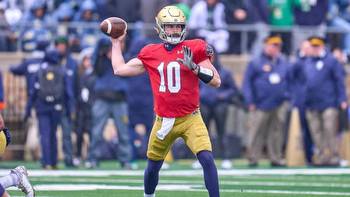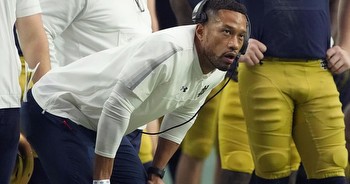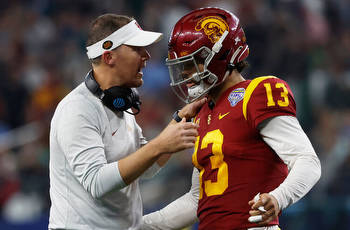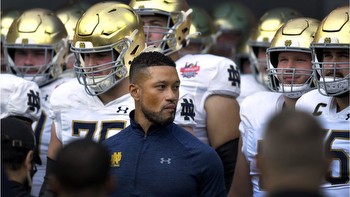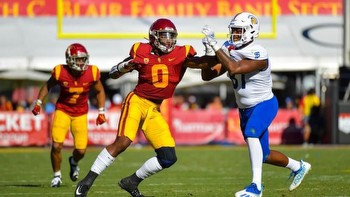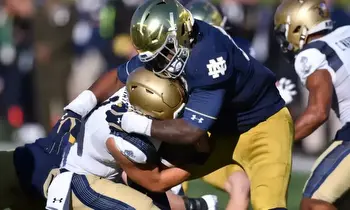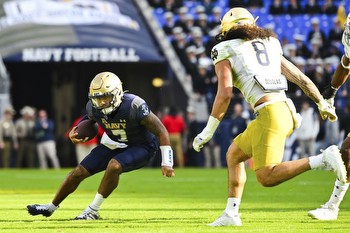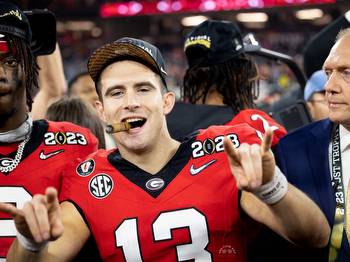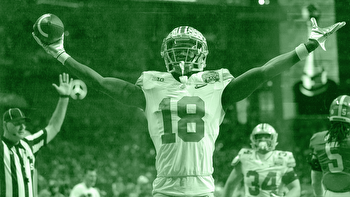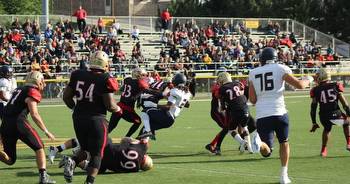College football betting guide: Trends to consider before making picks, predictions for the 2023 season
Sports betting is becoming more popular every year as many states across the country pass legalization, allowing millions of sports fans access a variety of sportsbooks and bets on their phone. It's even becoming more popular with college football players! While that's a serious problem, another one exists even for those who aren't breaking the rules: Not everybody knows what they're doing. Unless you're a professional gambler with in-depth knowledge of predictive metrics and models, sports betting is meant to be a hobby. It's a way to have some fun while engaging in a pastime with which you're already familiar. However, it's even more fun when you win more often than you lose.
There is no secret formula to winning money betting on games played by human beings - we are imperfect creatures, after all -- but my hope with this college football betting guide is to better inform newcomers how to bet on the sport they love. We'll review the basics and bust some betting myths along the way.
All stats and trends according to TruMedia
College football betting basics
What can you bet in college football? While sportsbooks will offer prop bets on players and game-time situations during the season, those are more difficult to master, particularly if one does not understand the basics. The bread and butter of college football betting consists of the point spread (or "spread"), the total and the moneyline.
The spread: The most popular bet, the spread is the number of points given to a team to handicap a game with two equally likely outcomes. For example, in Week 0, Notre Dame is hosting Navy and the Irish are favored by 20 points. The spreads are listed as Notre Dame (-20) vs. Navy (+20). The easiest way to think about this is the game starts with Navy given a 20-point lead. Suppose you bet Notre Dame (-20), the Irish need to win by at least 21 points for you to win your bet. If you bet Navy, you win your bet if Navy wins outright or loses by fewer than 20. In a case like this where the spread is a whole number instead of 20.5, a final margin of 20 points results in a "push," meaning you get your money back.
The total: This represents the total points scored in the game. The listed total for the same Notre Dame-Navy game is 50.5 points. You can bet on the over or under. If you think more than 50.5 points will be scored in the game, you bet the over 50.5. If you think there will be fewer, you bet the under 50.5. Pretty straightforward, isn't it?
The moneyline: This is the simplest bet because you're picking who will win the game outright. The math isn't straightforward, however. As a 20-point favorite, Notre Dame is clearly expected to win more often, which is why it's listed at (-1350) on the money line. Navy is at (+800). That means the payouts will differ depending on which side you choose.
A simple way to go about it is to think in $100 bets: To win $100 betting Notre Dame at (-1350), you must risk $1,350. Conversely, a $100 bet on Navy (+800) would win you $800 if the Midshipmen pull off the upset. You are paying the price, given the likelihood of your chosen outcome occurring.
Odds: Moneylines are not the only bets with odds attached to them. Spread and total bets have odds as well. Using the same game as the example, Notre Dame -20 is listed with (-110) attached. Navy +20 also has (-110), as do both sides of the total. This is called the "juice" or "vigorish" (a.k.a. "vig"). Essentially, it's how much the sportsbook charges you for the ability to make a bet. While -110 is standard, the odds can fluctuate for spreads and totals depending on various factors. Sportsbooks may feel one outcome is more likely and put a heavier juice on that outcome, or the book could be experiencing more bets on one side and look to protect itself from heavy losses by changing the juice. Like the moneyline, with -110 juice you have to bet $110 to win $100. Another factor you must consider, though, is implied odds.
Implied odds
The simplest way to think of implied odds is how often you have to win a particular bet to make money. The math is simple. If the odds are a negative number, remove the negative and add 100 to that number. Then divide the original odds by the new number. So, for -110, we add 100 to 110 to get 210. We then divide 110 by 210 to get 52.38%. That means you must be correct 52.38% of the time to make money on that wager. If you place 100 bets at (-110) and win 52, you will lose money even though you won more bets than you lost.
If the juice is a positive number, the process is slightly different. Using Navy's moneyline of +800, we again add 100 to the 800 before dividing 100 by the new number. So, it would be 100 divided by 900, which equals 11.11%. Navy needs to win the game 11.11% of the time for you to break even in the long run. Those are its implied odds. If you want to bet Notre Dame (-1350), you better be sure the Irish are winning the game at least 93.1% (1350/1450) of the time.
"But, Tom, if I add up the implied odds of all these bets, don't they equal more than 100%?"
They sure do. There's a reason there are so many sportsbooks out there and they all make money. They're designed so that no matter what happens, the sportsbook will make money, and you will lose money in the long run if you aren't familiar with the implied odds of a bet.
Now that we've gotten the education out of the way, let's get to some of the fun stuff.
Is there an advantage to betting favorites or underdogs?
There is not. One thing to remember as you enter the sports betting space is nothing is designed to make it easier for you to win. While you can sometimes see casual bettors betting on favorite --"they're the better team, of course they'll cover! "-- or the more recognizable team -- "Georgia is good, right?" -- that doesn't have an impact on results. Plus, the books know this and will juice things accordingly.
I have numbers to back it up if you're skeptical. Going back to the 2014 season, the beginning of the College Football Playoff era, favorites have gone 3,618-3,741 ATS. That's a cover rate of 49.2%. That means underdogs have covered 50.8% of the time.
But remember, the vig exists, and at standard juice of (-110) you need to win 52.38% of your bets to make money. So if you had bet every underdog in every game since 2014, you'd have won more often than you lost but still have lost a lot of money along the way.
Also, no matter the spread, there's no noticeable difference. A 20-point favorite is just as likely to cover as a 3-point favorite. So when you see a team that's a 31-point underdog, don't talk yourself into "this team starts with a 31-0 lead! I can't lose!" You can, and you will half the time.
For entertainment purposes, here's a look at the schools that have been favored the most since 2014 along with the schools that have covered the most often as favorites. Below that will be most frequent underdogs.
Most frequent favorites (since 2014)
Most successful favorites (min. 30 games)
Most frequent underdogs (since 2014)
Most successful underdogs (min. 30 games)
Is the over or under a better bet?
Using our sample size of the last 10 seasons, there's more of an advantage here than the spread but not enough to win money. Since 2014, the under has gone 3,680-3,482 for a cover rate of 51.4%. Again, assuming standard juice, we need to win 52.38% of the time, so we'd have lost less money on the under but have lost it all the same.
All that said, there are some things to consider when deciding to bet on the total. None of it's foolproof, but it's a decent place to start. Typically, teams that move at a quicker tempo on offense and run a lot of plays are more likely to score points. Conversely, the teams that move slowly, run the ball a lot and play the field position game score fewer points.
Another thing to look for is how teams perform in the red zone. An offense that can easily move the ball down the field but struggles to finish drives and settles for field goals can sometimes "trick" you. Some defenses play a bend-but-don't-break style that allows plenty of yards but shuts things down in the red zone and holds teams to field goals.
I always pay attention to how the two teams in a game perform in the red zone on both sides of the ball before placing a bet on the total. There is no magic formula to find winners, but paying attention to this can give you a slight leg up on those who don't. It's not a bad thing to consider when betting the spread, either.
There are some significant rule changes that could affect things in 2023 to be aware of, too. The clock will no longer stop following a first down until the final 2 minutes of the half. It's a rule change designed to make games shorter (for television) but could impact betting.
The clock not stopping as often will lead to fewer plays per game, and the fewer plays, the fewer chances to score points. It's possible the sportsbooks could be slow to adjust to the rules and unders could be a market inefficiency in the opening weeks.
As we did with favorites and underdogs, let's look at which teams go over the total the most often and which ones tend to stay under.
Best 'over' teams (min. 100 games)
Best 'under' teams (min. 100 games)
Do trends matter?
Not nearly as much as people will lead you to believe. From a purely mathematical standpoint, trends hold no predictive value. A team covering its last five games as a road underdog does not guarantee they'll cover the sixth.
Trends are nice to support theories about a game, but they should never be followed blindly. I'll use my favorite "trend" as an example. Since the 2005 season, when service academies play (Air Force, Army and Navy), the under has gone an astounding 43-10-1. It's been a bet I've placed unthinkingly for years, but I'll need to be reassured about some things before continuing in 2023.
Why? Because the trend isn't related to the particular schools but their style of play. Service academies run option offenses, which means they run the ball 80% of the time. They also take a lot of time between plays to shorten the game. So games between these schools feature far fewer plays and possessions than a typical college football game. The fewer possessions, the fewer opportunities for points, and the lower the scores stay.
Army is changing its offense in 2023, however. It's going to a shotgun-based option offense similar to what Coastal Carolina ran under Jamey Chadwell. I don't know what kind of tempo Army plans to use, but with the significant changes to its offense, the trend that's proven so profitable over the last 18 years may have run its course.
Just because it's worked in the past doesn't mean it will continue to prove successful.
How am I supposed to make money doing this?
Short answer: you aren't. I know that much of what I've written here can make it seem like there's no point in betting on sports, but it depends on your ultimate goal. If you want to be a bettor that makes money in the long run, it's possible. Plenty of people do, but they devote a lot of time and attention to doing so. They aren't just opening their phone five minutes before kickoff and going with their gut.
They spend hours monitoring stats and data to form power ratings and looking for spots to exploit. And these pros and semi-pros will tell you that it gets harder to find them every single year, particularly now that it's legal to bet on sports in so many parts of the country.
That's why the best advice I can give you is to have fun. Do not start betting on games thinking you're going to get rich. You might get lucky and get a big win, but you're far more likely to lose in the long run. So never bet more than you're comfortable losing, and remind yourself that it's all designed to have you lose.
When a commercial tells you how great the parlays are at a sportsbook, ask yourself, "Why do they want me to bet parlays so badly?" Also, the "odds boosts" offered by books are rarely as beneficial to you as they'll have you believe. That's not to say there aren't boosts worth taking, but use your better judgment before placing a bet simply because the sportsbook is pushing.
Also, if you read this and manage to crack the code, remember the person who helped set you on the path to wealth beyond your wildest dreams, will you?
